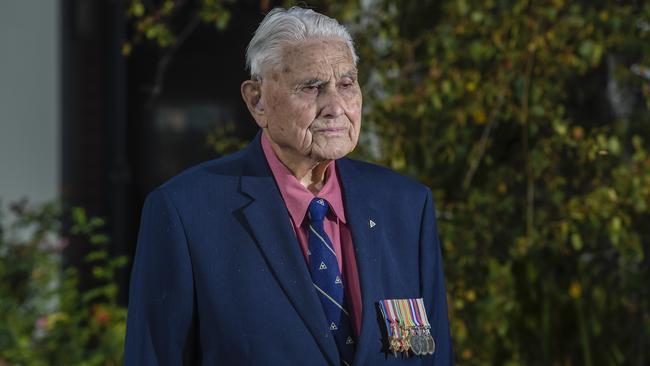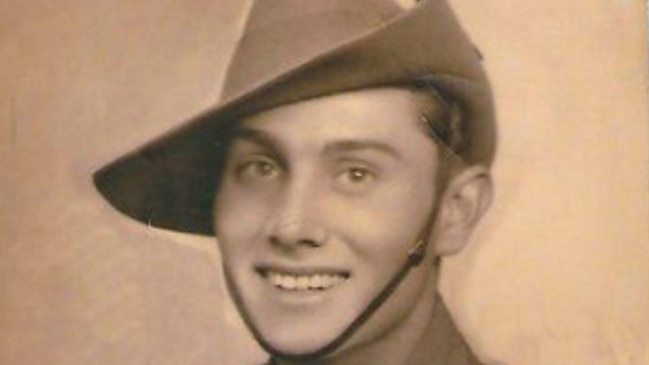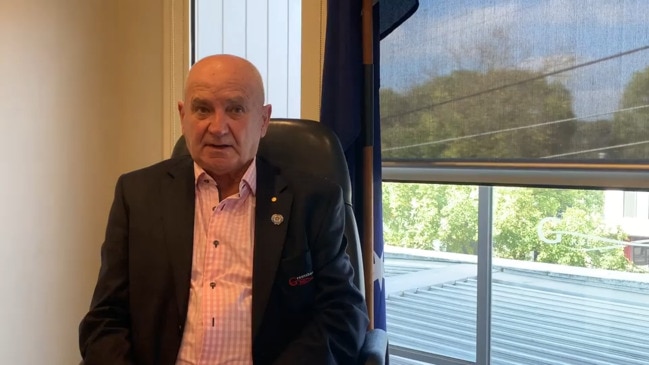Digger made peace with lingering horrors of time spend on Thai-Burma Railway
Private Keith Fowler came home after 3½ years as a prisoner of war on the Thai-Burma and made an immediate return to normal life – until the horrors came back six years later.

When Private Keith Fowler came home after 3½ years as a prisoner of war on the Thai-Burma Railway, he kissed the ground at Adelaide Airport and made a happy and immediate return to normal life.
“I felt like I had been away for a fortnight,” Mr Fowler, now 101 years old, told The Australian.
“I don’t know why, maybe the memories were taken away from me to protect myself, but I had no feelings of the POW life whatsoever. I just came home and started normal life again.”
Having just turned 18, Mr Fowler enlisted in the Australian Imperial Force on July 6, 1940, and was assigned to the 2/3rd Machine Gun Battalion, serving in the Middle East as part of the Australian 7th Division.

The last thing he did before leaving to fight was propose to his girlfriend Hazel Rosser, who waited through the full five years of the war for her fiance to return. They married soon after, had a son, and Mr Fowler got a job working as a commonwealth clerk at Adelaide’s Daw Park hospice, processing paperwork for returned soldiers, many of whom were doing it tough.
“I was handling all the notes for outpatients and one day I was reading a file about some poor fellow who was struggling,” Mr Fowler said. “He was considered a decent kind of a chap but one who, on account of his mental problems, had been deemed a good candidate for psychotherapy. ‘There’s a lucky bloke’, I thought. I hope he gets better. It was only when I looked at his file again that I realised that the bloke was me.”
Mr Fowler had held things together for six years after the war when he says he was hit “like a thunderbolt” as an unstoppable newsreel in his mind replayed every horror he had witnessed and endured as a prisoner of the Japanese. As with so many of the 22,000 Australian POWs, Mr Fowler’s experience was marked by illness, injury and the ever-presence threat of death.
By the end of the war he had contracted malaria, hookworm, lost more than 30kg, almost perished through fever, and was very nearly executed when a Japanese sergeant busted him lighting a fire to cook his fellow soldiers a snack they called “doovers”, grilled rice balls made by straining the grains from the rice slurry they were fed by the Japanese.
“The rice was disgusting, like milky white water, but we could make it more palatable by straining the rice to make the doovers,” Mr Fowler said.
“Being the youngest by about eight years, I was assigned the job of gathering the wood and making the fire. I wasn’t aware that you weren’t allowed to light a fire in the camp and, when we got caught by the Japs, they made us all line up and said that they wanted the man who lit it to step forward.
“Everything twitched on me, I can tell you. I thought there is no way I am stepping forward. None of us did. The Japs had another conference and what happened next wasn’t so easy. They said if the man who lit the fire doesn’t step forward, we will start shooting each of you one at a time until the man who did it steps forward.
“Well, then I had no choice. I stepped forward. One of the Japanese sergeants whipped himself into a frenzy and took his rifle and put the barrel into my mouth. Something out of the blue said to me: ‘look him in the eye’. I thought to myself that would only make it worse, but I figured things couldn’t get much worse, so I lifted my eyes up and stared at him for a good six seconds. He put his rifle down. And that was it. I am still here.”
His near execution is just one of many stories he tells where he almost lost his life while working barefoot, constructing the railway.

On one occasion, he was carrying a four gallon bucket of water to make tea for his fellow soldiers when he lost his footing in the mud and up-ended the entire contents over his legs, which immediately became ulcerated and would have been amputated if they became infected.
But Mr Fowler was tended to by fellow prisoner, Sir Edward “Weary” Dunlop, and other medicos within the camp who dressed and saved his legs. They saved his life again when he almost perished from malaria. In a rare act of empathy, the Japanese had given permission to the men to use a fresh water spring they found at the camp as a bathing site. With Mr Fowler running a temperature of 42C, the Aussie medicos carried him to the spring and lay him in the water until late in the evening, bringing his temperature down.
In an age when the term PTSD did not exist, Mr Fowler believes his eventual mental collapse came from an inability to process daunting existential questions which had been suppressed out of necessity while inside the prison camp.
“As time went on in the camp, and we were getting starved, our brains weren’t operating as they should,” he said. “We developed a jungle stare. We were getting weaker and weaker. I believe that things were happening to me that were out of the ordinary. I was being saved. Something was helping me and it wasn’t from on earth, I can tell you. These things happened continuously, and they were amazing. Something stopped me from dying.
“After it all ended, I went along quite tidily here at home for six years. Then all of a sudden I was hit like a thunderbolt. Every aspect of POW life covered me from tip to toe, brain, everything. My poor wife and the kids, I felt so sorry for them. But I did psychotherapy and it changed my life. It was simple training where, when all these thoughts of what happened to you come into your mind, you have to immediately think of something different altogether and push it out of your mind.
“That’s why I am always happy now. When anything unpleasant comes into my mind, it just goes. I have had a wonderful life ever since, except for when my dear wife died in 2009. But everything that has happened to me, I have accepted.”
Mr Fowler says he would not change a single thing about his life, and wants to keep telling his story to show that happiness is attainable regardless of the horror life can involve.







To join the conversation, please log in. Don't have an account? Register
Join the conversation, you are commenting as Logout